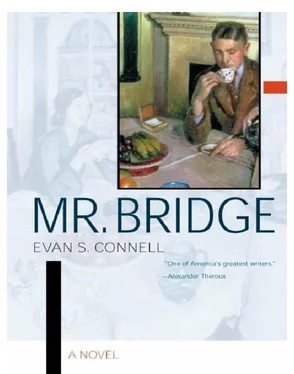“He’s jade,” she said. “I think he’s jade, and he’s ancient. The catalog says he’s from the Han Dynasty. I got him at an auction this morning.”
“Jade, you say?” He turned the pig around, inspecting it critically. “I was under the impression jade was of a greenish hue.”
“Green, blue, yellow, white, almost any color. This little guy was in somebody’s tomb. That’s why he’s brown, he was buried in the earth for such a long time.”
“Do you plan to have it authenticated?”
“Do you enjoy finding out you’ve been swindled?”
“Well, perhaps you haven’t been ‘swindled,’ as you put it. Of course, I have no idea—”
“Oh, do stop,” she interrupted. “I hate to think of what I paid. If Virgil finds out he’ll be furious. I can just see him!”
Mr. Bridge smiled. “I won’t inform on you. I hope you didn’t get stung. I expect a great number of these so-called antiques are in fact fraudulent, but naturally there is a chance of it being genuine.” He continued to inspect the carving. It seemed to be well done, but he could not see why anybody would want it. “I wasn’t aware you were an art collector.”
“I saw him and I had to have him. I was terrified somebody else would get him. I was ready to spend everything. Sell the house, Virgil’s golf clubs, the Cadillac, everything. Everything. Everything!”
“If you’re pleased with your purchase, all right,” Mr. Bridge said neutrally, and set the pig on the napkin. “Let’s hope the thing is worth whatever you paid.”
“You’re not as cold as you pretend to be,” she said. “I think your doors open in different places, that’s all. Most people just don’t know how to get in to you. They knock and they knock where the door is supposed to be, but it’s a blank wall. But you’re there. I’ve watched you. I’ve seen you do some awfully cold things warmly and some warm things coldly. Or does that make sense?”
“I’d have to think about it,” he smiled, and picked up the menu. “What do you recommend?”
“Turtle soup.”
“Turtle soup?”
“Never mind, Walter, there isn’t any. I was being foolish again.” She sighed, and with a dejected expression she began stroking the pig. “Tell me, Walter, have you ever ridden a bicycle?”
“A bicycle? Of course. When I was a boy. Why do you ask?”
“Suppose the four of us get bikes and go for a ride in Swope Park? Virgil would if you would. You’re such an influence on him.”
“I’m afraid I must doubt that last statement. Virgil is his own man.”
“What a nineteenth-century figure you are. Honestly!”
This was the sort of remark she made, affectionate and yet insulting. He did not like it. He watched her stroking the snout of the pig and it occurred to him that she was lavishing on a stone animal the affection which perhaps she denied her husband. She was a lost, unhappy little woman. He thought he should feel a sense of pity, but he did not. She jeered at too many things.
“Virgil says the country is going to hell in a basket. Is that so?”
“My opinion of Franklin Roosevelt is pretty well known. If somebody does not put a stop to this New Deal socialism it’s my conviction that the country will find itself in serious difficulty, and soon.”
“Virg says you wouldn’t give a Communist the time of day.”
“I have no love for Communism. None whatsoever. Let me tell you, if the Communists once obtain a foothold in this country they will stop short of nothing. Those people, if they ever get started, will divide up everything we have, make no mistake about that. Now you may not be disturbed by this prospect. You may not mind ‘sharing the wealth.’ But I, for one, have worked too hard for too many years to surrender lightly what I have earned and regard as my own.” He stopped talking. She already knew his opinion of Communism. He could not understand why she had brought up the subject.
“I find it one of the world’s loveliest thoughts,” she said. “Christ asked us to love each other. Marx is asking us to be sure everybody has enough to eat.”
She was attempting to start an argument. “If so, it has been a singular failure,” he said. “And let me remind you that Winston Churchill addressing the House of Commons stated recently: ‘If I had to choose between Communism and Nazism, I would choose Nazism.’ ”
“That son of a bitch.”
“Grace, let us not become any further involved in this. Seldom does an argument of this nature serve any constructive purpose.”
“Virg won’t talk to me either. He says I’m a woman and women have no grasp of politics. Nobody wants to talk to me. I feel like I’m living on an island.”
“What sort of talk is that,” he said with a deprecatory expression, and crooked a finger at the waitress, who had approached and was standing nearby.
As soon as he had given his order she resumed: “Tell me, are we getting into this European horror?”
“Let us hope not. Let us hope we remain uninvolved until it blows over.”
“Can we?”
“The prospects are not encouraging.”
“Alex says this is the first time a rotting civilization will be able to diagnose itself.”
Mr. Bridge took a sip of water, wiped his lips on the napkin, and said, “Alex presumes a great deal. Civilization may not be rotting. My personal opinion is that if Roosevelt and his left-wing advisers do not undermine the freedom and security of this nation we should see advances in many fields of endeavor which will literally stagger the imagination.”
“Jesus, Jesus,” she muttered with an affected Irish accent, “would you be thinking so, Walter Bridge?”
“If teasing me amuses you, I don’t mind.”
“Now could you guess who I saw just the other day, Walter Bridge?”
“I’m afraid not. Whom did you see?”
“Your friend Avrum Rheingold.”
“The man is scarcely a ‘friend,’ as you well know.”
“Ah, but he thinks he is.”
“As far as I am concerned he is a jackal.”
“He admires you.”
“I would sooner hear one courteous word from a man I respect than a barrel of fulsome garbage from such a man.”
“He’s taken to wearing a diamond as big as a cube of sugar on his pinky.”
“That is his privilege.”
“He dyes his hair.”
“Why do you tell me all this? You know perfectly well that what the man does, or is, is a matter of absolute indifference to me.”
“He may be moving into your neighborhood. He wants to buy the Edison house.”
“As far as I know, the Edison house is not for sale.”
“He says it is. He’s put in a bid for it.”
Mr. Bridge was silent. The thought of Avrum Rheingold living in the Edison house enraged him, but he was careful to hide his anger. He reached for his glass, took another sip of water, and cleared his throat. He did not like the feeling that swept through him, or the urge to say aloud that he approved of the pogrom in Germany.
“You really are, aren’t you,” she said as though she could read his mind. “I always suspected it.” And she began to cry.
100 New Writing, Ideas & Art
For his birthday Ruth sent a copy of Houyhnhnm together with a card announcing that he had been given a one-year subscription. It was published in Greenwich Village, which was to be expected. On the front cover was a drawing of a laborer and on the back were weakly printed photographs of contributors to the magazine, all of whom were young, three of them wearing turtleneck sweaters. He leafed through the magazine and did not much care for what he found. A portfolio of photographs of jazz musicians. A one-act play. Poems. Stories. Some pen-and-ink sketches. Several articles which looked as though they were trying to be controversial. He laid the magazine aside. However, because Ruth had given it to him he knew that sooner or later he must read a few pages. She might never know, or ask, whether he had read it or not, but because it was a gift from her he felt an obligation. In his next letter he thanked her for the subscription and said that while he had not yet gotten around to reading the first issue of Houyhnhnm he planned to do so.
Читать дальше












